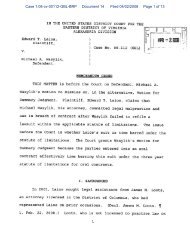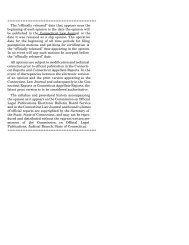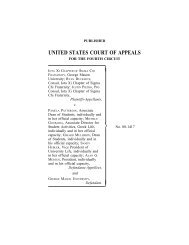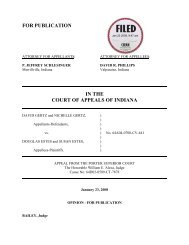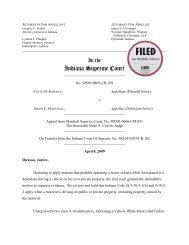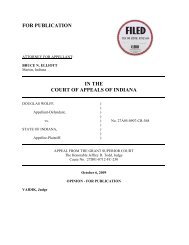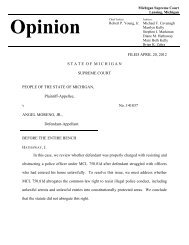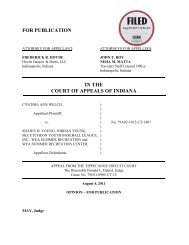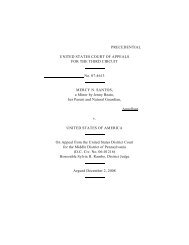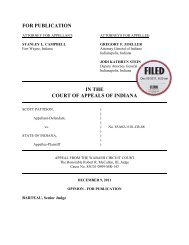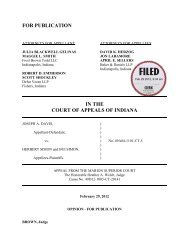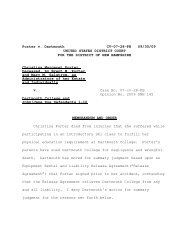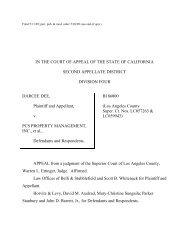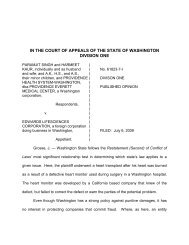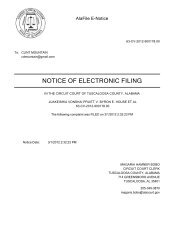07SA319 People of the State of Colorado v. Travis Lee Jewell ...
07SA319 People of the State of Colorado v. Travis Lee Jewell ...
07SA319 People of the State of Colorado v. Travis Lee Jewell ...
You also want an ePaper? Increase the reach of your titles
YUMPU automatically turns print PDFs into web optimized ePapers that Google loves.
<strong>07SA319</strong> <strong>People</strong> <strong>of</strong> <strong>the</strong> <strong>State</strong> <strong>of</strong> <strong>Colorado</strong> v. <strong>Travis</strong> <strong>Lee</strong> <strong>Jewell</strong> - February 4, 2008 - <strong>Colorado</strong> Supreme Court Opinions<br />
http://www.cobar.org/opinions/opinion.cfm?opinionid=6484&courtid=2 (3 <strong>of</strong> 5) [2/20/2008 10:29:24 AM]<br />
having trouble standing. Baker fur<strong>the</strong>r testified that <strong>Jewell</strong> had a strong odor <strong>of</strong><br />
alcohol and his eyes were bloodshot and watery. <strong>Jewell</strong>’ s blood alcohol level was<br />
later determined to be .291.<br />
While awaiting <strong>the</strong> ambulance, Baker advised <strong>Jewell</strong> <strong>of</strong> his Miranda rights. <strong>Jewell</strong><br />
listened intently and stated that he understood his rights. Baker <strong>the</strong>n asked <strong>Jewell</strong>,<br />
"With your rights in mind right now, do you wish to talk to me?" <strong>Jewell</strong> replied that<br />
he would talk to Baker. Over <strong>the</strong> next few minutes, <strong>Jewell</strong> made several<br />
admissions, including that he was "really drunk" at <strong>the</strong> time <strong>of</strong> <strong>the</strong> accident.<br />
At a hearing prior to trial, <strong>Jewell</strong> testified that his memory <strong>of</strong> <strong>the</strong> accident was<br />
"blurry." He told <strong>the</strong> court that he was "pretty drunk" and that <strong>the</strong> accident left him<br />
with a closed-head injury from hitting his head. He testified that it was hard to<br />
"think straight" about that afternoon. He fur<strong>the</strong>r testified that he was hung over<br />
<strong>the</strong> day after <strong>the</strong> accident and that his head continued to hurt for two weeks<br />
<strong>the</strong>reafter. The defense presented no evidence as to <strong>the</strong> severity <strong>of</strong> <strong>Jewell</strong>’ s head<br />
injury. <strong>Jewell</strong> did not testify that he blacked out after <strong>the</strong> accident or that his<br />
injuries made him unable to understand his Miranda rights.<br />
<strong>Jewell</strong> moved to suppress <strong>the</strong> incriminating statements made after <strong>the</strong> arrest,<br />
claiming that in light <strong>of</strong> his extreme intoxication he could not knowingly and<br />
intelligently waive his Miranda rights. After reciting <strong>the</strong> <strong>of</strong>ficer’s version <strong>of</strong> <strong>the</strong> facts<br />
in making its findings, <strong>the</strong> court made two rulings. First, it found that <strong>Jewell</strong>’ s<br />
statements to police immediately after his arrest were voluntary and not induced<br />
by coercive government action. Second, <strong>the</strong> trial court concluded that given his<br />
level <strong>of</strong> intoxication, <strong>Jewell</strong> could not have acted knowingly or intelligently when he<br />
waived his Miranda rights. Thus, <strong>the</strong> court suppressed <strong>Jewell</strong>’ s statements<br />
because his level <strong>of</strong> intoxication made it impossible to effectuate a valid Miranda<br />
waiver. The <strong>People</strong> brought this interlocutory appeal.<br />
II. Analysis<br />
Upon arrest, an <strong>of</strong>ficer must read <strong>the</strong> Miranda advisement to <strong>the</strong> accused, so <strong>the</strong><br />
accused is informed <strong>of</strong> his constitutional rights. Miranda v. Arizona, 384 U.S. 436,<br />
444 (1966) . The accused may <strong>the</strong>n waive his rights upon a proper Miranda<br />
advisement. Id. However, in order to be valid, <strong>the</strong> waiver must be voluntary,<br />
knowing, and intelligent. Id. A person makes a knowing and intelligent waiver <strong>of</strong><br />
Miranda rights when he has full awareness <strong>of</strong> <strong>the</strong> nature <strong>of</strong> <strong>the</strong> right being<br />
abandoned and <strong>the</strong> consequences <strong>of</strong> its abandonment. <strong>People</strong> v. May, 859 P.2d<br />
879, 883 (Colo. 1993); see also <strong>People</strong> v. Hopkins, 774 P.2d 849, 851 (Colo.<br />
1989).<br />
The only issue on appeal is whe<strong>the</strong>r <strong>the</strong> trial court erred in concluding that <strong>Jewell</strong>’ s<br />
waiver was invalid because it was not knowingly and intelligently made. In<br />
circumstances like this, <strong>the</strong> <strong>People</strong> carry <strong>the</strong> burden <strong>of</strong> proving <strong>the</strong> validity <strong>of</strong><br />
<strong>Jewell</strong>’ s knowing and intelligent waiver by a preponderance <strong>of</strong> <strong>the</strong> evidence.<br />
<strong>Colorado</strong> v. Connelly, 479 U.S. 157, 168 (1986). The court may consider any<br />
relevant factor to make this determination. <strong>People</strong> v. Kaiser, 32 P.3d 480, 484



